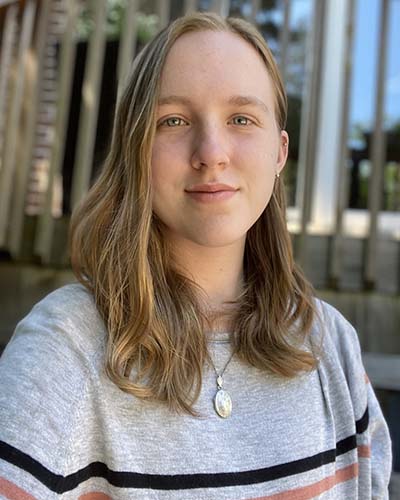Five years ago, the Foundation Year Program (FYP) Essay Prize was created to recognize a selection of student essays. FYP Director Dr. Neil Robertson explains that the essays chosen “represent the excellence that we are looking for in FYP.”
FYP students write and submit an essay approximately every two weeks, totaling twelve papers over the academic year. Robertson describes the essay assignments as, “the backbone through which students communicate their own learning, interpretations and understandings of texts as we’re going through the program. It’s simultaneously a way in which students develop and deepen their understanding of the challenging material that they’re reading, and work through the craft of being able to write essays that are compelling and thoughtful, while presenting their own reading and interpretation of these fundamental works.”
King’s President William Lahey awards the prizes each year following the final FYP lecture.
“It is always a pleasure and an honour to announce the awards for best FYP essays,” says President Lahey. “To be acknowledged in this way is a huge accomplishment for those honoured, because they, like all FYP students, know how much their writing has improved from the beginning of the program and how hard they have worked to achieve that improvement.
“But what I equally love is how happy their fellow FYPers are for the winners. It shows that FYP really is about friendship and solidarity and that these students’ awards represent the pride that everyone feels in their own and collective progress as thinkers and writers.”
We asked some of this year’s FYP Essay Prize recipients to share their thoughts on what they read and what they wrote in FYP.
Merrick Carr
What quotation did your essay respond to, and how did you approach it?
The quote I responded to was from Voltaire’s Candide:
“‘Let’s work without theorizing,’ said Martin; ‘it’s the only way to make life bearable,'”
I really tried to focus on the questions that this quotation brings forth, particularly concerning the ‘proper’ way to live. I felt that this quote really encompasses Voltaire’s attitudes toward philosophical speculation and its role in everyday life, so I wrote an essay that was geared towards these components. Most importantly, I approached it in a way that suited my personal interests, which I think positively impacted the quality of my work.
What’s your top tip for writing a FYP essay?
My top tip for FYP essays would be to not limit the thinking process. Each quotation is loaded with so many possible directions to take, so it’s very important to not commit to a particular view or idea too quickly. Really take the time to dive into what the author is trying to say, and always consider all sides of the argument. In my experience, the writing process goes way more smoothly when you give yourself lots of time to think critically about the reading.
Jessica Casey
 What quotation did your essay respond to, and how did you approach it?
What quotation did your essay respond to, and how did you approach it?
The quote I chose was from Virginia Woolf’s Mrs. Dalloway:
“But what an extraordinary night! She felt somehow very like him—the young man who had killed himself. She felt glad that he had done it; thrown it away.”
It’s a line spoken by Clarissa, a British socialite who identifies with Septimus, a traumatized war veteran who took his own life. This quote was tricky for me to make sense of because it brought together two extremely different characters in the story who have never even met.
I started with their similarities—both feel that modern life is futile and meaningless, both think of death as a comforting release. Clarissa can keep these thoughts internal by creating a social self and throwing parties. On the other hand, Septimus is unable to conform to a perceived normal, and upon being threatened by institutionalization and a horrific ‘rest cure,’ he took his own life. This begs the question—if Clarissa’s freedom and privacy were attacked as Septimus’ was, might she have reached the same fate?
My essay became about madness as a social construct and how the depicted mental health system’s construct of ‘sane’ and ‘insane’ might not prioritize mental wellness but rather the perceived health of British society. Since I was trying to compare two characters who have never even met, I had to locate them together using the story’s metaphors and motifs: luckily, there were many to choose from because Virginia Woolf is a genius.
What was your favourite text on the FYP reading list this year?
So hard to choose! Some of my top picks were Lucretius, Sappho, Montaigne, Chekhov, Cronon and Woolf. Voltaire might have been my favourite, though. He wrote this incredible satire called Candide, which poses some interesting questions about the morality of optimism, privilege, and the place of women. It’s also one of the books this year that genuinely made me laugh out loud (like when he said that the three most important occupations are “lovemaking, malicious gossip, and talking nonsense”).
Obinna Esomchukwu
 What quotation did your essay respond to, and how did you approach it?
What quotation did your essay respond to, and how did you approach it?
I responded to a quote from Pauline Johnson’s A Red Girl’s Reasoning:
“‘Do you mean to say that all my forefathers, for hundreds of years back, have been illegally born.'”
The essay was an attempt to resolve a question that was asked at tutorial—shout out to the amazing Tutorial 17—on why the relationship between [characters] Christie and Charlie was irremediable after it ended. I was curious about Christie’s decision to leave Charlie, and I tried to figure out why she left. So, my approach was based on curiosity about the characters and their actions.
What was your favourite text on the FYP reading list this year?
Teju Cole’s Open City. Perhaps this is a case of recency bias since Open City was the last text we read in FYP, or maybe it is just plain bias; the author and I are from the same country, Nigeria. Notwithstanding, Cole’s book led me to ideas that had never occurred to me. I am a better person because I read that book.
Eleanor Peebles
 What quotation did your essay respond to, and how did you approach it?
What quotation did your essay respond to, and how did you approach it?
My essay responded to a quotation from The Cherry Orchard by Anton Chekhov:
“LOPAKHIN: My father was a serf, belonged to your father and your grandfather before him. But you — you’ve done so much for me in the past that I’ve forgotten all that and love you as a brother. Or even more.”
I chose to concentrate more on the invisible forces present in Lopakhin’s lines, as that was the aspect that intrigued me most in the play. Lopakhin’s words are centred around the passage of time: ancestors, past actions, remembrance. As I went through the play for inspiration and looked at the way the characters spoke and the descriptions Chekhov provided, I could see how time could also be interpreted as a character. Ultimately, that’s what I used as my thesis—time as an active figure in the play, contributing to conversations in the form of pauses and being introduced alongside the human characters with scene descriptions stating the time of day or year.
What’s your top tip for writing a FYP essay?
Try to find a topic that actually interests you. The more you are excited to write an essay, the faster it will go and the better it will come out. Of course, sometimes, try as you might, there might not be a topic that thrills you. In that case, plan your argument and give yourself plenty of time. One of the best things I found for proofreading was also this: read it out loud. There are always things you catch when it’s audible that you don’t when scanning the page.
Sophia Wedderburn
 What quotation did your essay respond to, and how did you approach it?
What quotation did your essay respond to, and how did you approach it?
My essay responded to a quotation from W. E. B. Du Bois’ “Of The Coming of John” from The Souls of Black Folk. The quotation reads:
“‘John,’ she said, ‘does it make every one—unhappy when they study and learn lots of things?'”
This quotation is said by Jennie, John’s sister, as she wonders why John’s education has turned their small town of Altamaha completely upside down.
When the quotations were released for this paper, I knew instinctively that this was the quote I wanted to write about. I was drawn to it, as it poignantly captures Du Bois’ focus on the value of education of African Americans, and how it complexifies and amplifies racial tensions between the black community and the white community. I approached this quotation by relating it to the broader work of Du Bois in The Souls of Black Folk, and then zeroed in on how John’s education affects the black community and the white community in Altamaha in “Of the Coming of John.”
What was your favourite text on the FYP reading list this year?
My favourite text on the FYP reading list this year was Annie John by Jamaica Kincaid. This post-colonial novel is a coming-of-age story and addresses the colonial relationship between Antigua and Britain. I was excited to read this text from the first time I viewed the FYP reading list and was anxious to arrive at Section 6 to discuss it in my tutorial. Jamaica Kincaid is from Antigua and Barbuda, and reading an incredibly well crafted novel by an author who reflects and represents my own Caribbean lineage in FYP brought me indescribable joy.
Jamaica Kincaid’s writing style is poignant and riveting, a FYP text that truly asks you to delve deep beneath the surface of just the words on the page. The FYP reading list does include some minority group authors, but it would be amazing to see an even more diversified list in the future.

